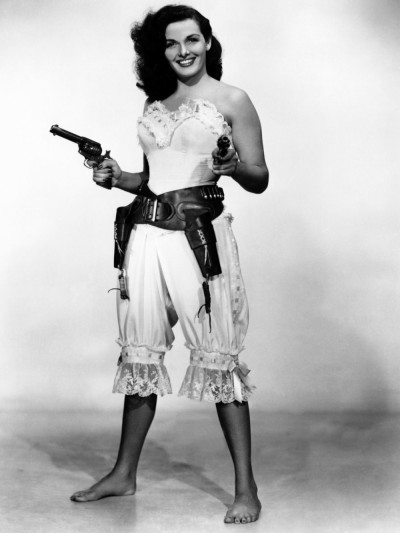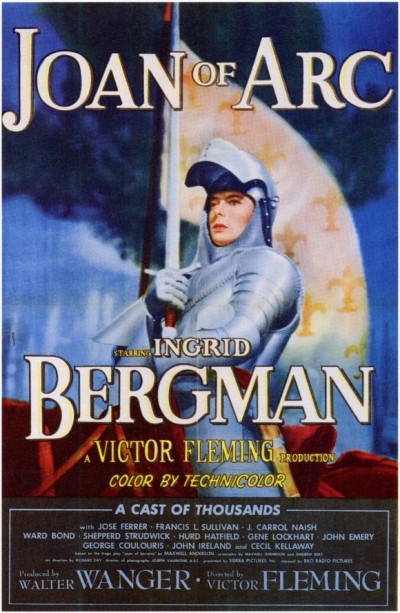★★★
“Starring the two and only Jane Russell.”
 Or, to steal another line from Mr. Hope, “Culture is the ability to describe Jane Russell without moving your hands”. It’s surprisingly advanced for its 1948 era, with Russell playing Calamity Jane, who is busted out of prison to go undercover and infiltrate an arms ring guilty of the heinous crime of selling weapons to Indians. [Because, from a liberal 2015 perspective, god forbid anyone try to even the playing field on that particular genocide…] She’s set up with a cover husband, but when he turns up dead, she’s forced to improvise and settles on ‘Painless’ Peter Potter (Hope), an itinerant dentist, as the patsy for the role, as they join a wagon train heading West. Needless to say, he’s delighted, and the legend of his own mind only grows after he fends off an attack by Indians – unaware, all the sharpshooting was entirely Jane’s doing. For her aim is to set him up as some kind of heroic Federal agent, provoking the gang into tipping their hand with retaliation.
Or, to steal another line from Mr. Hope, “Culture is the ability to describe Jane Russell without moving your hands”. It’s surprisingly advanced for its 1948 era, with Russell playing Calamity Jane, who is busted out of prison to go undercover and infiltrate an arms ring guilty of the heinous crime of selling weapons to Indians. [Because, from a liberal 2015 perspective, god forbid anyone try to even the playing field on that particular genocide…] She’s set up with a cover husband, but when he turns up dead, she’s forced to improvise and settles on ‘Painless’ Peter Potter (Hope), an itinerant dentist, as the patsy for the role, as they join a wagon train heading West. Needless to say, he’s delighted, and the legend of his own mind only grows after he fends off an attack by Indians – unaware, all the sharpshooting was entirely Jane’s doing. For her aim is to set him up as some kind of heroic Federal agent, provoking the gang into tipping their hand with retaliation.
It’s impressively even in tone, with Jane clearly the smarter, braver and more talented one of the pairing, running rings around Peter as she manipulates him into being the unwitting stalking horse for her mission. It’s only right at the end, when they both have (somewhat inexplicably) been captured by the Indians, that he rises above his humble origins and skills, doing his part in a rousing finale involving some brisk horse stunts. Russell’s performance was the subject of some mockery, Life magazine saying at the time, in a feature called Jane Russell’s Gamut of Emotions, “she demonstrates how to express a great variety of emotions, without twitching a facial muscle.” However, I think it has perhaps stood the test of time better than Hope’s comic mugging, playing into the cold and calculating killing machine trope – she would rather whack Potter into unconsciousness than kiss him. Certainly, it has lasted better than Bob’s rendition of Buttons & Bows, which inexplicably won the Academy Award that year for best original song.
To be honest, the comedic aspects also seem rather out of keeping with the body count, though it’s hard to tell how much of this may be parody of the genre – certainly, the site of Potter standing beside a literal pile of native American corpses is more likely to provoke embarrassed silence these days, than mirthful chuckles. The film is on much less questionable grounds concentrating on the nicely reversed dynamic between the two leads; even if this collapses into the obligatory and entirely expected fluffy ending, the final sight gag did actually make me laugh out loud, and that’s not easy to do.
Dir: Norman Z. McLeod
Star: Bob Hope, Jane Russell, Robert Armstrong, Iris Adrian





 This film’s origins as a stage play are painfully apparent, and you can also see why the distributor’s felt it needed to have 45 minutes cut out before it could be released, as frankly, it’s a bit of a bore. The battle to recapture Orleans is the only action of note here, even though that represented the start of the Maid’s campaign to restore France to its proper ruler (Ferrer), rather than the end. After that, this more or less skips forward to his coronation, then Joan’s capture, spending the rest of the movie – and there’s a lot of it – going through the trial, and the railroading of the heroine into, first throwing herself on the church’s mercy, then recanting her recantation and returning to wearing men’s clothes, thereby sealing her fate. There’s not much here which you won’t have seen before, if you’ve seen any of the other versions of the story, touching the usual bases from Joan’s revelations that she’s going to be the saviour of France, through her trip to see the Dauphin, and so on. It does downplay the “voices” aspect, especially early on, perhaps a wise move since it’s difficult to depict, without making her seem like a religious fruitcake.
This film’s origins as a stage play are painfully apparent, and you can also see why the distributor’s felt it needed to have 45 minutes cut out before it could be released, as frankly, it’s a bit of a bore. The battle to recapture Orleans is the only action of note here, even though that represented the start of the Maid’s campaign to restore France to its proper ruler (Ferrer), rather than the end. After that, this more or less skips forward to his coronation, then Joan’s capture, spending the rest of the movie – and there’s a lot of it – going through the trial, and the railroading of the heroine into, first throwing herself on the church’s mercy, then recanting her recantation and returning to wearing men’s clothes, thereby sealing her fate. There’s not much here which you won’t have seen before, if you’ve seen any of the other versions of the story, touching the usual bases from Joan’s revelations that she’s going to be the saviour of France, through her trip to see the Dauphin, and so on. It does downplay the “voices” aspect, especially early on, perhaps a wise move since it’s difficult to depict, without making her seem like a religious fruitcake.